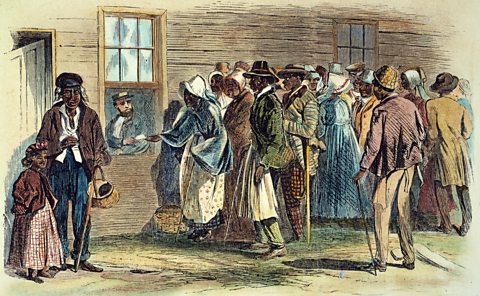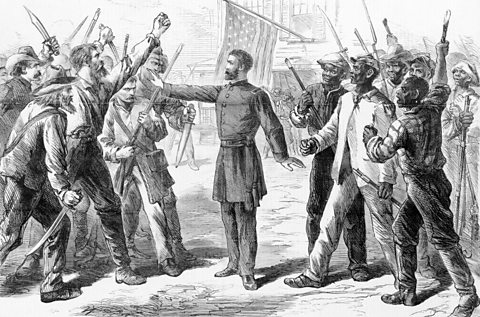Successes and difficulties of the Freedmen’s Bureau
Successes of the Freedmen’s Bureau
- established 40 hospitals
- distributed 21 million rations
- established over 4000 schools from elementary through to college. Nearly a quarter of a million former slaves benefitted from different levels of education
- helped former slaves legalise marriages, locate lost relatives and assisted black veterans

Issuing rations to the old and sick at the Freedmen's Bureau in Richmond, Virginia. 1866.
Difficulties faced by the Freedmen’s Bureau
- white Southerners were strongly opposed to it. Racism was very prevalent and they believed that former slaves should not be educated
- Andrew Johnson (who became president after Lincoln was assassinated) opposed the Bureau - he thought it interfered with individual states' government, and that it gave preferential treatment to a particular group of people
- the Bureau was underfunded and understaffed. At its peak it had only 900 agents
- Bureau agents were often intimated or attacked by terrorist organisations like the The Ku Klux KlanA group of White Anglo-Saxon Protestants who used violence against black Americans and others. who resented the fact that they were helping former slaves
- locals resented the Northern
Yankee
teachers who came to teach the former slaves - much of the confiscated or abandoned land had been given back to the plantersPlantation owners in the American South.
- the land that the Bureau was left with to distribute to former slaves was often inferior and undesirable

An 1868 engraving from Harper's Bazaar showing a Bureau officer holding back a group of angry whites.
In the summer of 1872, CongressThe legislative body of the US government, made up of the Senate and the House of Representatives. responding in part to pressure from the Southern States shut down The Freedmen’s BureauAn agency established by Abraham Lincoln to help millions of former black slaves and poor whites in the South..